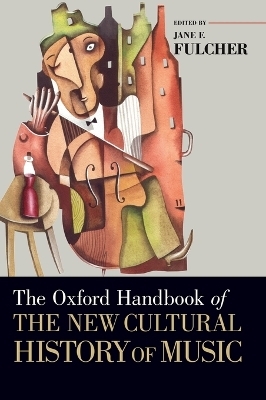
The Oxford Handbook of the New Cultural History of Music
Oxford University Press Inc (Verlag)
978-0-19-534186-7 (ISBN)
The volume illuminates how musicologists and historians are practicing the new cultural history of music, employing similar rubrics and specifically those emerging from the recent synthesis of theoretical perspectives on language, symbols, meanings, and their social as well as political dynamics. These include questions of cultural identity and its expression, or its constructions, representations and exchanges, into which music provides a significant mode of access. The scholars who work in these areas are concerned with those cultural sites of the construction or attempted control of identity, as well as its interrogation through active agency on a social and on an individual level, which embraces subjectivity in its relation to the larger cultural unit. Here we may see attempts on the part of both historians and musicologists to engage with the new ways of perceiving the articulation of music, ideology, and politics opened up by figures such as Foucault, Bourdieu, Elias, Habermas and others. Their study of meanings and symbols is thus both relational and contextual as they strive to unlock the idioms not only of social and political power, but of the strategies of contestation or of refusal.
Other scholars represented in this volume are particularly interested in cultural practice, collective memory, transmission and evaluation as it is forged and then negotiated, here influenced by figures such as de Certeau, Corbin, Chartier and Nora. Hence a part of this collection is devoted to cultural experience, practice and appropriations, grouping together those cultural arenas in which music both illuminates and is further illuminated by a study of uses, collective practices, modes of inscription, and of evaluation or reception. The contributors here, both historians and musicologists, are apprised of all the dimensions that may affect the construction of signification, including specific material inscriptions as well as the symbolic potential of the artistic language. Hence here we see a concern, characteristic of "the new cultural history," with how the forms assumed by texts may become an essential element in the creation of their meaning since different groups encounter, "possess," and experience a work in various ways, and within the context of substantially different aural and visual cultures.
Jane Fulcher is Professor of Musicology at the University of Michigan. She has received research awards in both the United States and Europe, including The American Council of Learned Societies, the National Endowment for the Humanities (two awards), the Wissenschaftskolleg zu Berlin, the National Humanities Center, the Institute for Advanced Study, Princeton, New Jersey (where she was the Edward T. Cone member in Music Studies for 2003-04). In addition, she has three times been invited to be visiting professor at the Ecole des Hautes Etudes en Sciences Sociales in Paris.
Introduction. Defining the New Cultural History of Music: its Origins, Current Directions and Methodologies Jane F. Fulcher PART I: CULTURAL IDENTITY AND ITS EXPRESSION: CONSTRUCTIONS, REPRESENTATIONS, AND EXCHANGES Constructions or Representations of the Body, Gender, Sexuality, and Race A Woman's Place: Antiphons and Responsories for Virgin Martyrs in the Office James Borders "Music, Violence, and the Stakes of Listening Richard Leppert "Music and Pain Andreas Dorschel Subjectivity and the Shaping of the Self in Society The Road into the Open: from Narrative Closure to the Endless Performance of Subjectivity in Mahler and Freud at the Turn of the Century John Toews Schoenberg, Poet, Priest, Dictator: Reassembling Meaning in Exceptional Times Julie Brown The Strange Landscape of Middles Michael Beckermann Nationalism, Cosmopolitanism, and Trans-Nationalism The Genre of National Opera in European Comparative Perspective Philipp Ther Cosmopolitan, National, and Regional Identities in European Musical Life William Weber Mendelssohn on the Road: Music, Travel, and the Anglo-German Symbiosis Celia Applegate Popular and Elite Cultural Intersections or Exchanges Shooting the Keys: Musical Horseplay and High Culture Charles Garrett Yvette Guilbert and the Revaluation of the Chanson populaire during the Troisième République, 1889-1914 Jacqueline Waeber Remembrance of Jazz Past: Sidney Bechet in France Andy Fry PART II: CULTURAL EXPERIENCE: PRACTICES, APPROPRIATIONS, AND EVALUATIONS Urban, Aural, and Print Culture An Evening at the Opera in 17th-Century Venice Edward Muir Josquin des Prez, Renaissance Historiography and the Cultures of Print Kate van Orden From 'the Voice of the Maréchal' to Musique Concrète: Pierre Schaeffer and the Case for Cultural History Jane F. Fulcher Symbols, Icons, and Sites of Collective Memory or Ritual A Matter of Style: State Sacrificial Music and Cultural-Political Discourse in Southern Song China (1127-1279) Joseph Lam Ernani Hats: Opera as a Repertory of Political Symbols during the Risorgimento Carlotta Sorba Modalities of National Identity: Sibelius Builds a First Symphony James Hepokoski Politics, Aesthetics, and Transmission Beethoven, Napoleon, and Political Romanticism Leon Plantinga Translating Herder Translating: Cultural Translation and the Making of Modernity Philip Bohlman The Eye of the Needle: Music as History after the Era of Recording Leon Botstein Afterward: Whose Culture? Whose History? Whose Music? Michael P. Steinberg Index
| Reihe/Serie | Oxford Handbooks |
|---|---|
| Zusatzinfo | 37 line-drawings and 41 halftones |
| Verlagsort | New York |
| Sprache | englisch |
| Maße | 254 x 185 mm |
| Gewicht | 1168 g |
| Themenwelt | Kunst / Musik / Theater ► Musik ► Musiktheorie / Musiklehre |
| Geschichte ► Teilgebiete der Geschichte ► Kulturgeschichte | |
| Sozialwissenschaften | |
| ISBN-10 | 0-19-534186-4 / 0195341864 |
| ISBN-13 | 978-0-19-534186-7 / 9780195341867 |
| Zustand | Neuware |
| Haben Sie eine Frage zum Produkt? |
aus dem Bereich


